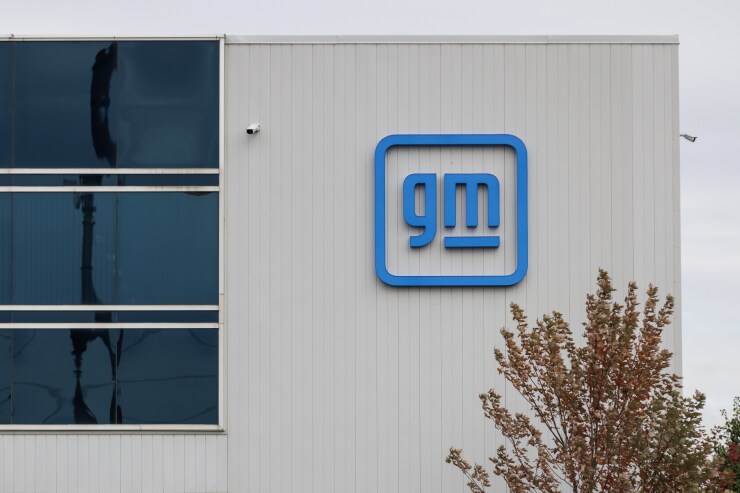
General Motors has decided to shelve
GM's financial arm has been
The latest development comes less than two weeks after the Utah Department of Financial Institutions approved GM Financial's application to establish an ILC. And it comes just days after
The withdrawal of GM Financial's application is not likely to be the end of its multiyear effort to establish an ILC. Dan Berce, president and CEO of GM Financial, said the company plans to refile with both the FDIC and the state regulator in Utah, which has more industrial banks than any other state.
"GM Financial remains confident in the viability of our bank application, which is anchored by a proven, well-capitalized business model led by an experienced management team and supported by the company's decades of financial services expertise," Berce said in a press release. "Utah's approval validates the strength of the bank's proposed business plan and management team, and we look forward to refiling with the FDIC and UDFI."
GM declined Tuesday to comment further on its decision. Some industry observers expect the auto giant to wait until after this year's presidential election to determine how to move forward.
GM's voluntary withdrawal of its application — which means it cannot sue the FDIC over the matter — may signal that it is waiting for a more favorable regulatory environment, said Michele Alt, a partner at the Klaros Group who specializes in bank licensing applications.
Under the Biden administration,
The fact that GM withdrew its application "suggests that GM decided to wait, given that this is an election year and it's too close to call," said Alt, who has not been involved with GM's ILC application. "GM may have just decided to say, 'We'll wait a few months and then resubmit.'"
GM's decision to retreat, coupled with the FDIC's approval of Thrivent's application, is again putting the spotlight on ILCs, which have long been mired in controversy. Those who support the charter say that ILCs have historically been stable, but some traditional bankers and other critics argue that ILCs can present too much risk by mixing banking with commerce.
Prior to Thrivent, the most recent applicants to be okayed were
What the latest developments imply for other potential ILC applicants remains unclear. Industry observers have assumed that
Another U.S. automaker,
Ford's application is still pending with the FDIC and with the Utah regulator, a company spokesperson said in an email.
Isaac Boltansky, an analyst with BTIG, said he would caution against interpreting the approval of Thrivent's application as a green light for other ILC hopefuls.
"GM and other applicants are in the brackish water where commerce and banking mix," he said, adding that Thrivent is directly engaged in the traditional business of banking.
"Thrivent is a unique case, given its business," Boltansky said before pointing to comments Gruenberg has made about the need to focus on the strength of applicants' parent companies. "All said, the approval of Thrivent's charter allows Gruenberg to say that they are actively considering charters, even though the FDIC appears closed for business on this front."
Todd Baker, a senior fellow at Columbia University's business and law schools, said Thrivent's approval challenges the traditional expectations about ILC approvals during the Biden administration, demonstrating that, in very limited cases, an ILC charter is achievable.
Other pending ILC applications are from non-financial companies without an established banking presence in the U.S., which raises the bar on operational and compliance preparation, Baker noted.
"It is important not to get giddy about future ILC approvals," said Baker, who is also managing principal of Broadmoor Consulting. "This is a very unusual case where a credit union — an insured depository institution subject to comprehensive regulation but which is not subject to holding company regulation — is converting into an ILC. There is a strong parent which has committed to high levels of capital and agreed to serve as a source of financial strength."
"This is a far cry from a startup fintech," he added.
Baker said he anticipates there will eventually be more approvals if the GOP takes the White House, given that the most recent Republican FDIC chair, Jelena McWilliams, pushed through several ILC applications. But he does not expect more approvals before the fall election.
The National Community Reinvestment Coalition — a consumer advocacy group that has
The withdrawal of GM's application "is a win for the lower-income and marginalized communities and consumers that NCRC and our members serve," said Eden Forsythe, chief policy counsel at NCRC. "The law has kept banking and commerce separate for generations for a good reason."
The FDIC's recent actions on ILCs may provide some clarity about the kinds of companies that stand a chance of getting approved. Regulators will continue to seriously consider approvals only for firms that pose lower systemic riskiness, Baker said.
"I would expect to see continued focus on low-risk business plans and parent financial support commitments backed by true financial strength, [so] 'fintechs need not apply'" Baker said.
In March, a bipartisan group of senators, led by long-time ILC proponent Sen. Mitt Romney, R-Utah,
Romney's office did not return emails Tuesday seeking comment.
The Independent Community Bankers of America, a small-bank lobbying group that has long opposed the approval of deposit insurance applications for ILCs, continues to express concern about industrial banks. In a statement following the FDIC's approval of Thrivent's application, ICBA President and CEO Rebecca Romero Rainey said "the FDIC should deny ILC applications to prevent firms from skirting full regulatory oversight and violating U.S. policy separating banking and commerce."
In an interview Tuesday, Susan Sullivan, the ICBA's senior vice president of congressional relations, reiterated that point and said the group would be "concerned about any increase in applications from companies seeking ILC" charters.
As for whether GM's withdrawal will deter other companies from pursuing the charter, Sullivan said, "We hope so."
"If you want to be a bank, seek a regular bank charter."






